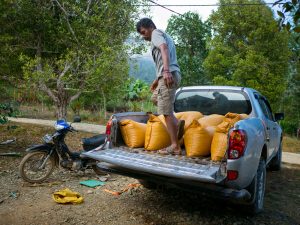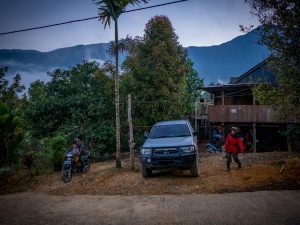[Klik disini untuk membuka halaman ini di Google Translate]
The information on this page is available for buyers of Sisola Coffee (primarily roasters and importers) who wish to provide detailed origin information to their customers. Feel free to use this information and photos on product pages, emailers, print items, social media, etc. Please don’t hesitate to ask for any clarification, questions, or confirmation of any of this information. We believe in transparency and honesty in the coffee trade. info@sisolacoffee.com
Location and Identity:
Starting at the broadest level and zooming in; all our 2021 coffee is from:
- Indonesia
- Sulawesi Island
- South Sulawesi Province
- Luwu District (or “Tana Luwu”, literally meaning “Land of Luwu”)
- Latimojong Sub-District
- Tolajuk Village (“Desa Tolajuk”)
- Our partner farmers in Tolajuk are on the eastern slope of Mount Latimojong (Gunung Latimojong), the highest peak in Sulawesi at 3478 meters above sea level.
That’s a lot of information, so what should fit on your bag or your website? You are free to pick and choose from the above. Sulawesi is a relatively large coffee region and generally distinct from other Indonesian islands, so we have observed that often “Indonesia” is omitted from labels. For decades coffee from the Luwu area has been mixed in with Toraja coffee and sold under that name. Everyone from farmers to local government has expressed strongly that they would like their coffee to keep its own identity, and we are the first to be making steps to do that. Therefore, we request that labels for our coffee include “Sulawesi” and at least one of the local identifying words “Tana Luwu”, “Latimojong”, and/or “Tolajuk”. Feel free to adapt the above information to your chosen format and contact us if you have any questions.
Farm and Varietal Information
We purchase freshly picked, ripe cherry from dozens of families in the Tolajuk Village, each of which own and maintain just a few hectares of coffee farm. If you publish coffee elevation as a range the vast majority comes from an area at 1200-1500m (though some outliers go down to 1100 and up to 1600), or if you are looking for a specific number 1350m is a fair average, and also the elevation of our purchasing and pulping station.
The seedlings planted in Luwu have all come from neighboring Toraja and Enrekang in the days of Dutch colonization until the present. There is much confusion about what specific varieties are present in all these regions, but we believe it to all be of the Typica family, including specific varietals of ‘Old Typica’, Jember, and Lini-S. We hope to work with WCR in the coming year to get genetic testing done so we can be more confident going forward.
Processing Information
We are currently producing primarily honey process coffees, and a smaller quantity of natural process coffee. We buy freshly picked, ripe coffee cherry directly from farmers. Both natural and honey process coffees go through an extended, controlled fermentation in the cherry.
All of our coffee is hand sorted at multiple stages. First we check that all coffee received is freshly picked, ripe, coffee cherry. Naturals are floated as cherry and Honey coffee immediately after pulping and floaters are discarded. Lastly, the green bean is hand sorted twice with a slow pass and a final check.
All our drying is on raised beds and Honey takes from 11-18 days and Natural 24-36 days, depending on weather conditions, until the parchment reaches a moisture content below 12%. Parchment and cherry pods are then rested for a minimum 30 days in a temperature and humidity controlled room, where they all equalize to the exact same moisture content of 11.2%. All our coffee is then dry-hulled, double-sorted by hand, and packaged in GrainPro.
There is some additional information about our three coffee processes, including awards received, cupping notes, and cupping scores received on our Coffees page: https://sisolacoffee.com/coffees/
Processor Information
Our company name is PT Sisola Specialty Coffee, often just Sisola Coffee. The word Sisola comes from the local Luwu language and means “together” (or “bersama” in Indonesian language), conveying the idea that we are working with farmers to elevate the quality and market opportunities for Luwu coffee. Some buyers have used our name in their description or sourcing information, feel free, but this is not expected.
Transparent Purchasing / Farm Gate Pricing
We purchase ripe coffee cherry a short walk from the farmers’ homes, and in 2023 for every pound of green coffee $3.14 USD was paid directly to the farmers for coffee cherry. We have no exclusivity contracts or obligations with any farmers and they are completely free to sell to us or do their traditional processing and sell to other traders. In order to sell to us the farmers need to be more careful and selective in their picking, but are then freed of the labor in pulping, washing, and initial drying at home which they must do when selling to all other buyers in the region. The other traders in the region are commodity-focused and in the 2023 season their prices fluctuated from $1.80-2.20 USD per pound (green weight equivalent), so our price was about 50% greater.
The farmers appreciate that our price doesn’t fluctuate through the season, and they also appreciate being paid transparently and promptly, which isn’t always the norm. We pay our farmers in cash at least twice per week, so when they bring coffee to be weighed and received they either receive cash immediately or a receipt that they can redeem for cash within 2 days. Every transaction is documented giving us a paper record of exactly who contributed and how much (perhaps that will be an off-season project to get it all put in a rather large spreadsheet!).
In addition to $3.14 per pound paid to the farmers, $0.57 per pound was paid to our local employees, so $3.71 per pound has gone directly into the pockets of the local community.
We pay more and we pay faster, but it’s not charity, it’s adding value and returning that value to the very top of the supply chain. With the farmers bringing a higher standard of ripeness, and our company processing with a higher standard of care, together we produce a specialty product that stands apart in this region where coffee has only prior been sold into commodity markets.
Roasting
If you have an IKAWA sample roaster please try the profile we have created for cupping our coffees: IKAWA
Photos
Feel free to use any of these photos for your sales and marketing materials.



























